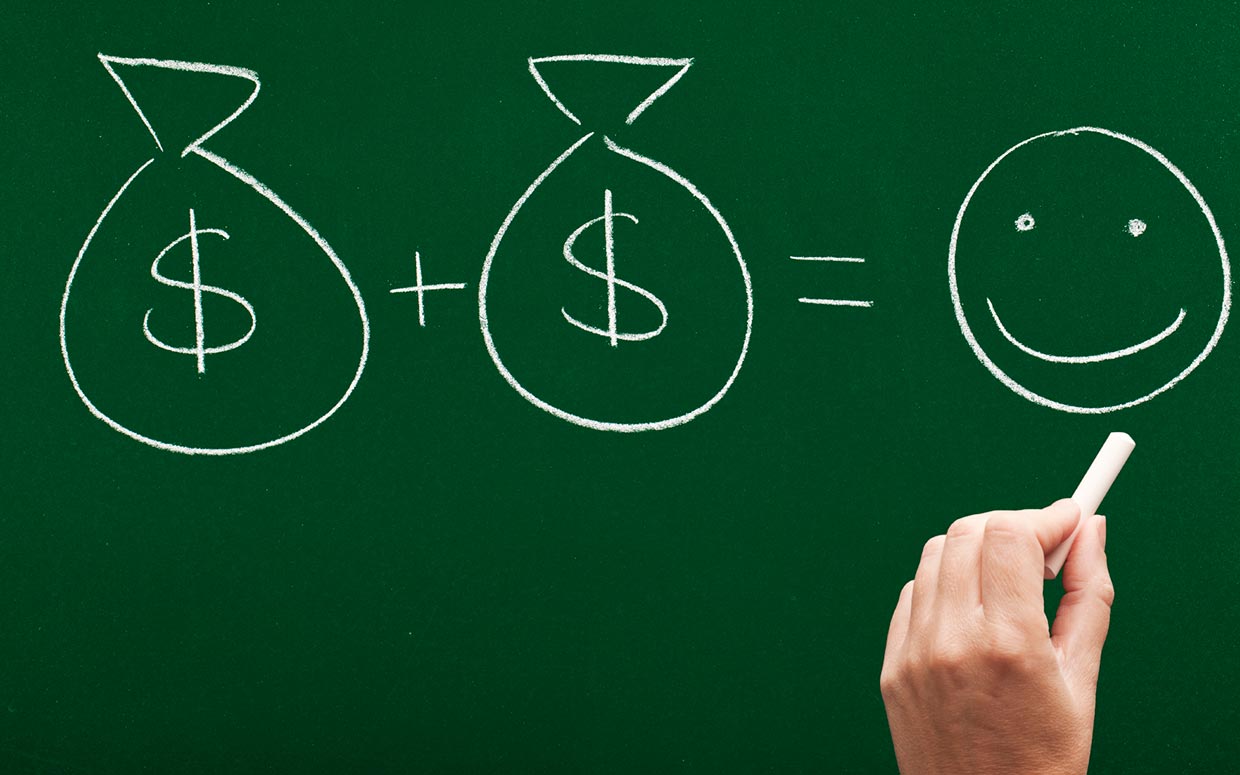Yes, Money Can Buy Happiness
LifestyleSpending
This is a guest post by author and Harvard Business School Professor, Michael Norton.
Does money buy happiness? We certainly behave as though it does, spending most of our waking hours pursuing it. If only we got that raise, owned that second home, third car or iPad, things would be better, we tell ourselves. We would finally be happy.
Truth be told, people drastically overestimate the impact of changes in income on their well-being. In a survey I conducted with my colleagues Elizabeth Dunn and Lara Aknin at the University of British Columbia, we asked 315 Americans to rank their happiness on a 100-point scale and predict how happy they would be if they made ten different incomes, ranging from $5,000 up to $1,000,000. Those who reported earning $25,000 a year predicted that their happiness would double if they made $55,000. But when we measured the actual happiness of these two groups, the change was only 7%. Beyond that, our data showed that once people reach the median income in the U.S. (about $60,000), the happiness return on additional income is very small.
Hapless lotto winners, take heart. We did discover at least one way to buy happiness with your money: Give it away.
Why might this be the case? We hypothesize that making more money leads people to accumulate more and more material goods, but not to accrue the things that really make people happy–relationships with others. Think of the wealthy person who buys three homes with 15 guest bedrooms–yet finds himself without any friends or family to host. Even shopping, Americans’ longtime preferred method of social interaction, now requires no social interaction at all. You can fill your 16-bedroom home with goods without leaving it. All you need is a cable modem and a PC.
To test our idea, we approached strangers on the street and gave them different sums of money ($5 or $20) and told them to spend it by 5 p.m. that day. Half were told to spend the money on themselves, while the other half were told to spend it on others. When reached that evening, those who spent the money on themselves bought things like coffee and food, while those who gave money to others reported spending it on things like gifts for their siblings or donations to the homeless.
The result? Those who had spent their money on others reported feeling much happier at the end of the day than those who had spent their money as they usually did, on themselves. There was no difference in happiness between those who spent $5 or $20, suggesting that it is not how much money you spend, but how you spend it, that boosts the spirits. When we asked people to choose what would make them happiest, most people predicted that spending money on themselves would make them happier than giving it away, suggesting that people overestimate the buzz they get from a new purchase and underestimate the warm-and-fuzzy benefit to social spending.
Money certainly makes some things in life easier, but many aspects of life remain irritatingly the same. You might make more money, but you’re still stuck with the same in-laws, siblings, traffic jams and software glitches. So should you keep trying to make money? Absolutely. As long as you remember to spend some of it on others.
Michael Norton was recently on Moven CEO Brett King’s radio show, Breaking Banks.
Image Source: Parade.com
Worth your time
- Casino Online Prelievo Immediato
- Best Non Gamstop Casinos
- Non Gamstop Casinos UK
- Gambling Sites Not On Gamstop
- Casino Non Aams Legali
- Meilleur Site Casino Live
- Casino Sites Not On Gamstop
- Casino Sites UK
- Non Gamstop Casinos UK
- UK Non Gamstop Betting Sites
- Non Gamstop Casino
- UK Casino Not On Gamstop Self-exclusion
- Non Gamstop Casinos UK
- Non Gamstop Casino Sites UK
- Casinos Not On Gamstop
- Non Gamstop Casino UK
- Best Betting Sites UK
- Online Slots Sites UK
- Meilleur Casino En Ligne Avis
- Meilleur Casino En Ligne France
- Casino Not On Gamstop
- Casino Sites Not On Gamstop
- Non Gamstop Casino UK
- Casino Non Aams
- Casinos Not On Gamstop
- Siti Casino
- Casino En Ligne
- Casino Non Aams Sicuri
- Nouveau Site De Poker En Ligne
- 신원인증 없는 카지노
- Migliore Casino Non Aams
- 온라인홀덤
- Meilleur Casino En Ligne
- Meilleur Casino En Ligne
- Casino En Ligne France
- Casino En Ligne
- Casino En Ligne Français 2026
- Casino En Ligne Argent Réel France
- Casino Online Non Aams 2026
- Casino En Ligne




Leave a Reply